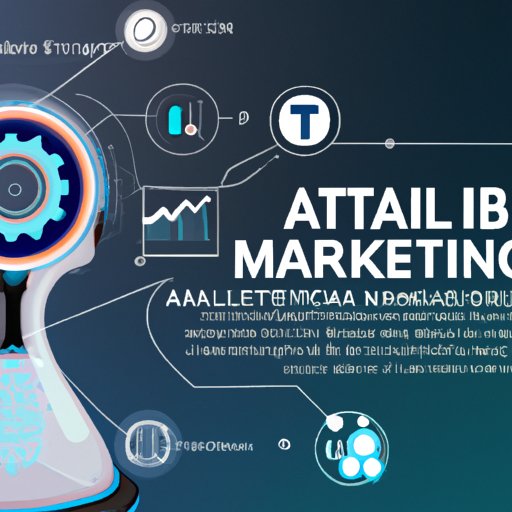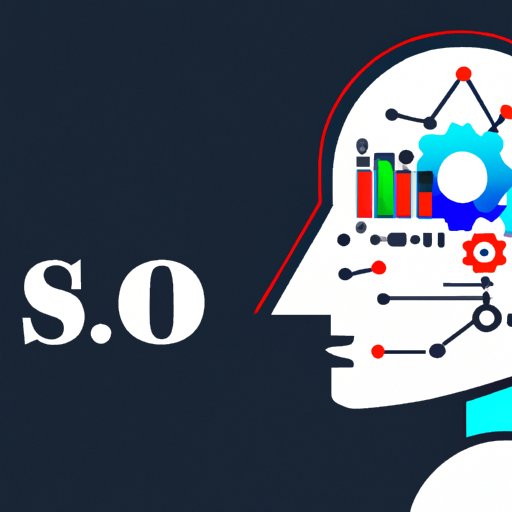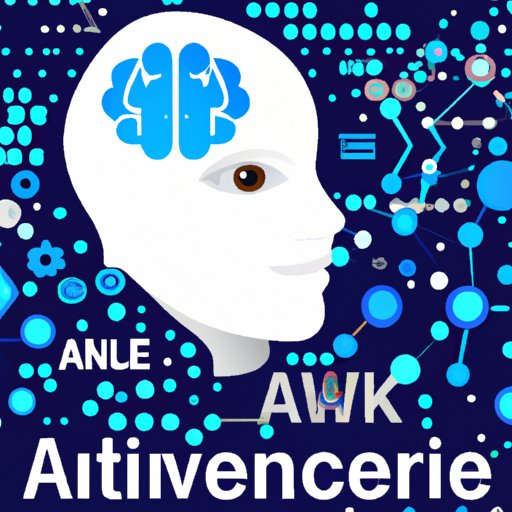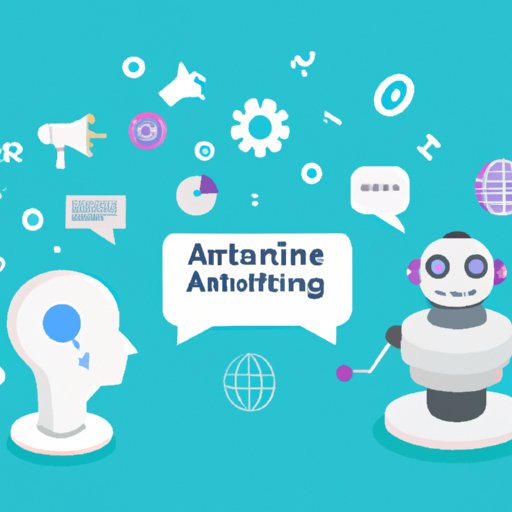Introduction
Artificial Intelligence (AI) has been making waves in the world of marketing for some time now. AI marketing is a form of marketing that uses technology to automate certain processes, enabling marketers to gain insights into customer behaviour and preferences in order to better target and personalize their campaigns. By leveraging AI, marketers can increase efficiency, save time, and drive higher returns on investment (ROI).

Exploring the Benefits of AI Marketing
AI marketing offers a plethora of benefits, including improved targeting and personalization, increased efficiency and automation, and increased ROI.
Improved Targeting and Personalization
By using AI-driven algorithms to analyze customer data, marketers can identify customer segments and target them with relevant, personalized messages. According to research from Salesforce, “68% of customers say being treated like a person, not a number, is very important to winning their business”. AI enables marketers to deliver more personalized experiences that resonate with customers, resulting in higher engagement and conversion rates.
Increased Efficiency & Automation
AI automates many manual tasks such as data analysis, content creation, and advertising optimization, allowing marketers to spend less time on mundane tasks and more time strategizing. AI also helps marketers make smarter decisions faster by providing real-time insights and analytics. According to an Accenture survey, “77% of executives believe AI will help them make faster decisions”.
Increased Return on Investment (ROI)
AI-driven marketing campaigns can generate higher ROI than traditional campaigns due to their ability to target the right customers with the right message. AI-powered tools can also be used to optimize ad campaigns in real-time, helping marketers reduce waste and maximize their budget. According to a study from Adobe, “marketers who use AI see a 49% increase in ROI”.
The Different Types of AI Marketing Strategies
There are several different types of AI marketing strategies that businesses can use to improve their marketing efforts. These include predictive analytics, natural language processing (NLP), and machine learning.
Predictive Analytics
Predictive analytics uses historical customer data to predict future customer behaviour. It enables marketers to anticipate customer needs and create targeted campaigns tailored to those needs. According to a Gartner survey, “90% of organizations that have adopted predictive analytics report measurable improvements in their operations”.
Natural Language Processing (NLP)
NLP is a type of AI that enables machines to understand and interpret human language. It can be used to automatically answer customer queries, process customer feedback, and provide personalized recommendations. According to a study from Oracle, “73% of consumers prefer to interact with brands through natural conversations”.
Machine Learning
Machine learning is a type of AI that enables machines to learn from data and adapt to new situations without explicit programming. It can be used to automate tasks such as sentiment analysis, customer segmentation, and ad placement optimization. According to a survey from Forrester, “91% of marketers believe machine learning will revolutionize the way they do business”.
How AI is Revolutionizing Digital Advertising
AI is transforming the way digital advertising works. AI-driven tools can automate ad placement and optimization, enhance audience segmentation and targeting, and automate bid management.
Automated Ad Placement and Optimization
AI-powered tools can automate ad placement and optimization, enabling marketers to quickly test different ad variations and determine which ones perform best. AI can also be used to optimize ad campaigns in real-time, ensuring that ads are always reaching the most relevant audience. According to a study from MediaPost, “AI-driven advertising campaigns have seen a 41% increase in click-through rates compared to manual campaigns”.
Enhanced Audience Segmentation and Targeting
AI can be used to segment audiences based on their interests, behaviour, demographics, and more. This allows marketers to create more targeted campaigns that are tailored to each customer segment. According to a report from the Interactive Advertising Bureau (IAB), “AI-driven audience segmentation can help marketers achieve up to 70% higher click-through rates and 20% more conversions”.
Automated Bid Management
AI-driven bid management tools can be used to automate the bidding process, allowing marketers to focus on other aspects of their campaigns. AI-enabled bid management tools can also be used to optimize bids in real-time, ensuring that campaigns are always running at peak efficiency. According to a study from Kenshoo, “AI-driven bid management can help marketers achieve up to 10% higher ROI”.
AI Tools for Automating Your Social Media Marketing
AI can also be used to automate social media marketing tasks such as content creation, post scheduling, and engagement.
Automated Content Creation
AI-driven tools can be used to generate content such as blog posts, videos, and images. AI-enabled tools can also be used to curate content from other sources, allowing marketers to quickly find and share relevant content with their followers. According to a survey from Sprout Social, “67% of marketers believe AI-generated content can help them save time”.
Automated Post Scheduling
AI-powered tools can be used to automate post scheduling, enabling marketers to set up campaigns in advance and let the tool take care of the rest. AI-enabled tools can also be used to optimize post timing, ensuring that posts are reaching the right audience at the right time. According to a study from Hootsuite, “AI-driven post scheduling can help marketers increase engagement by up to 20%”.
Automated Engagement
AI-driven tools can be used to automate engagement such as responding to comments and direct messages. AI-enabled tools can also be used to monitor conversations, allowing marketers to quickly identify and respond to customer queries. According to a study from Microsoft, “AI-driven tools can help marketers reduce response times by up to 70%”.

How AI Can Help Improve Your SEO Efforts
AI can also be used to automate SEO tasks such as keyword research, link building, and site analysis.
Automated Keyword Research
AI-driven tools can be used to automate keyword research, allowing marketers to quickly find relevant keywords and phrases. AI-powered tools can also be used to identify long-tail keywords, enabling marketers to target more specific audiences. According to a study from Moz, “AI-driven keyword research can help marketers increase organic traffic by up to 40%”.
Automated Link Building
AI-enabled tools can be used to automate link building, allowing marketers to quickly find and build high-quality backlinks. AI-powered tools can also be used to identify link opportunities and track link performance, enabling marketers to maximize their SEO efforts. According to a study from MarketMuse, “AI-driven link building can help marketers achieve up to 50% higher rankings”.
Automated Site Analysis
AI-driven tools can be used to automate site analysis, enabling marketers to quickly identify and fix issues that may be affecting their SEO performance. AI-enabled tools can also be used to track key metrics such as page speed, crawl errors, and broken links, allowing marketers to stay on top of their SEO game. According to a study from Ahrefs, “AI-driven site analysis can help marketers increase organic traffic by up to 30%”.

Examining the Future of AI and Its Impact on Marketing
As AI continues to evolve, its impact on marketing will continue to grow. Here are some of the ways AI is expected to revolutionize marketing in the near future:
Growing Popularity of Chatbots
Chatbots are becoming increasingly popular among businesses as a way to interact with customers. AI-powered chatbots can be used to answer customer queries, provide product recommendations, and even process payments. According to a study from Oracle, “59% of customers prefer to use chatbots for customer service”.
Use of AI to Understand Consumer Behavior
AI-driven tools can be used to analyze large amounts of data and gain valuable insights into customer behaviour. This can help marketers better understand their customers and create more effective campaigns. According to a survey from McKinsey, “60% of marketers believe AI will help them better understand their customers”.
Increasing Focus on Voice Search Optimization
Voice search is becoming increasingly popular, and AI-enabled tools can be used to optimize websites for voice search. AI-driven tools can also be used to identify common voice search queries and create content to target those queries. According to a study from BrightEdge, “AI-driven voice search optimization can help marketers increase website traffic by up to 40%”.
Conclusion
AI is revolutionizing the way marketers do business. AI-driven marketing campaigns can offer improved targeting and personalization, increased efficiency and automation, and increased ROI. AI can also be used to automate tasks such as content creation, post scheduling, and site analysis. As AI continues to evolve, it will become increasingly important for marketers to stay ahead of the curve and leverage AI to maximize their marketing efforts.
(Note: Is this article not meeting your expectations? Do you have knowledge or insights to share? Unlock new opportunities and expand your reach by joining our authors team. Click Registration to join us and share your expertise with our readers.)
